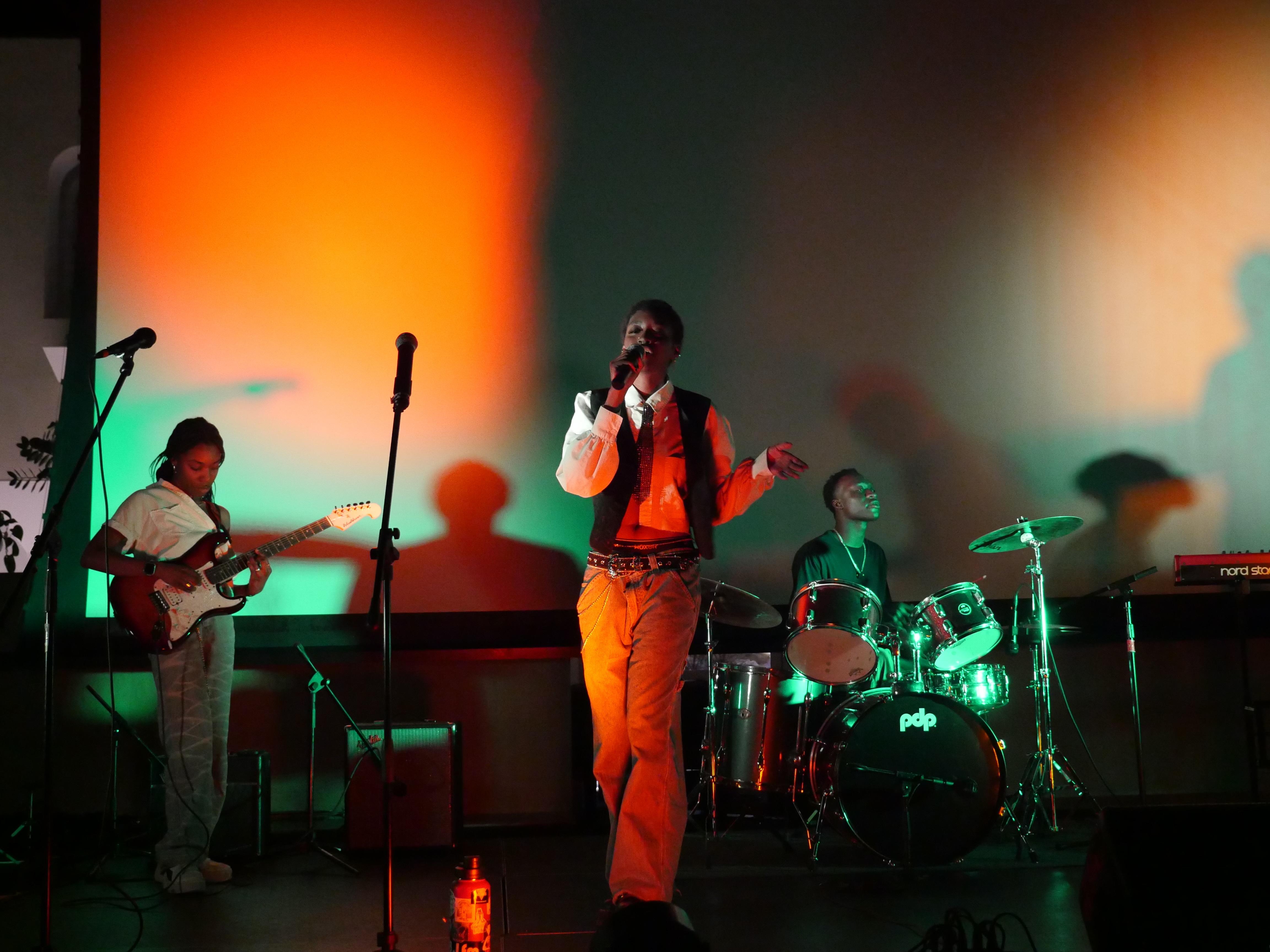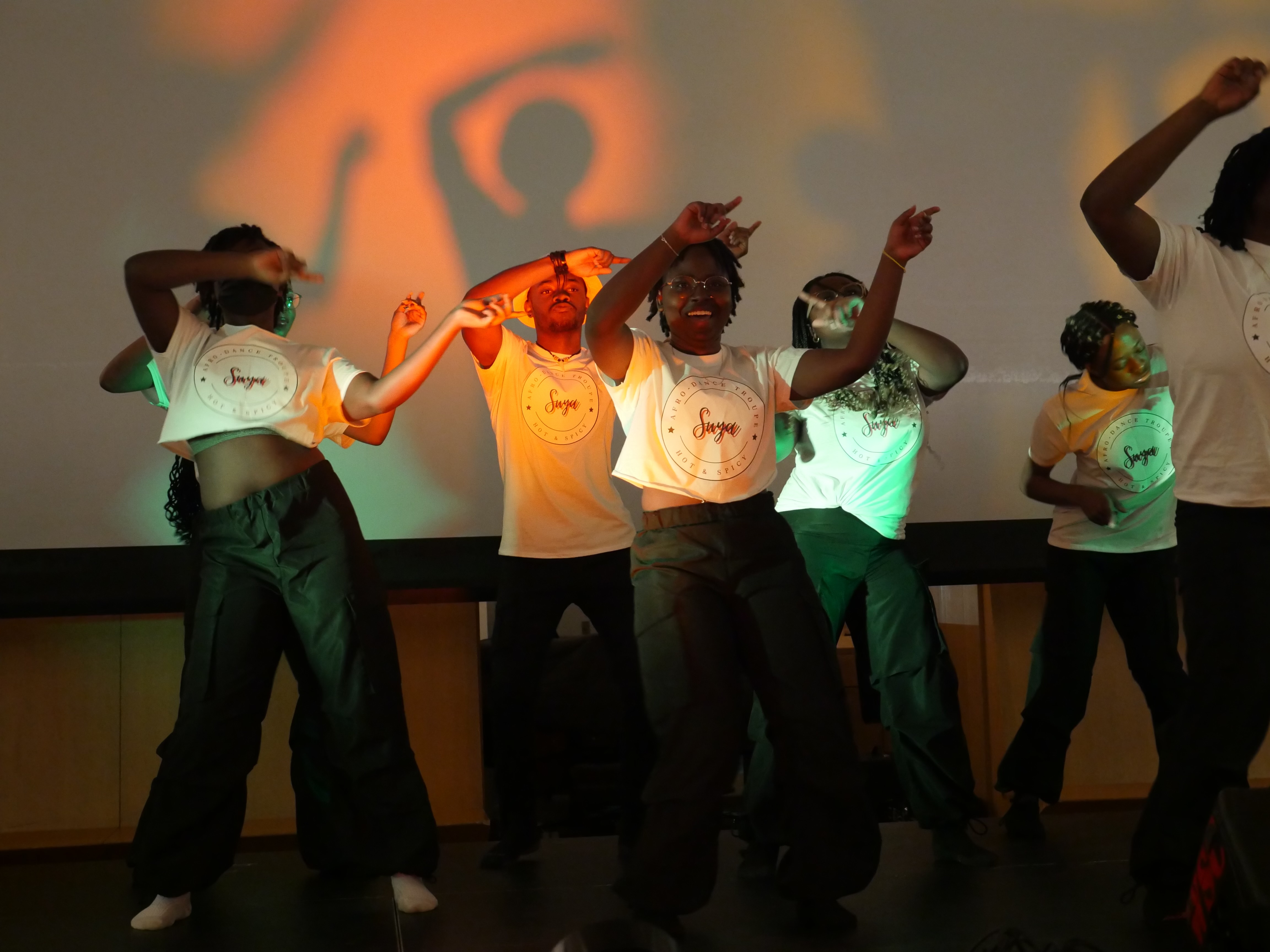
c/o Rose Chen
Members of the Black Student Union, Ujamma (BSU), worked with University administrators to arrange events throughout February in celebration of Black History Month (BHM). The calendar included workshops, discussion spaces, social gatherings, film screenings, and performing arts events.
The planning committee consisted of Alise Mackey ’24, Shekinah Mba ’26, Oluchi Chukwuemeka ’25, Tre Studgeon ’26, Daelle Coriolan ’24, Associate Director of Student Involvement Jen Cheng, Director of the Resource Center Demetrius Colvin, Assistant Director of the Resource Center Kiara Ruesta-Cayetano, and Communications Social Media Specialist Anastasia Daniels.
At several BHM events, attendees shared knowledge about political and social justice. In addition to the Martin Luther King Jr. workshop on Feb. 21, where attendees discussed prison reform and how over-policing affects Black and Brown communities, Ujamaa partnered with Students for Justice in Palestine and the Revolutionary Student Collective for an event on Feb. 22 that focused on intersectional solidarity between Black and Palestinian communities.
Other events provided space for students to connect and discuss their experiences on campus. At Love in Context on Feb. 8, students made Valentine’s Day cards and discussed love and relationships with the Resource Center’s Race, Ethnicity, and Nationality interns. Candid Campus, on Friday, Feb. 9, was a place for Black students to share stories and support, and Embrace Your Colors on Saturday, Feb. 10 provided space for Black queer students to celebrate their identities and build community. Ujamaa also collaborated with the Muslim Student Association and the Caribbean Student Association to share tips and perform demonstrations surrounding Black hair products and techniques.

c/o Rose Chen
In the sphere of performing arts, the Wesleyan Film Series highlighted Black actors, directors, and histories this month. Screenings included “Malcolm X” (1992), “This Is Not a Burial, It’s a Resurrection” (2019), “Kokomo City” (2023), “Sorry To Bother You” (2018), “Carmen Jones” (1954), “Shaft” (1971), and “Sister Act” (1992).
On Friday, Feb. 16, Professor of English and Comparative Literature at Columbia University Robert O’Meally gave a talk on Romare Bearden’s reimagining of Homer’s Odyssey through spirituals and the blues.
SHADES, Wesleyan’s student of color theater collective, then staged a reading of “What Comes Next?” an original play by Senica Slaton ’26, on Saturday, Feb. 24. In the play, five Black teenage girls in 1960s Montgomery, Ala. grapple with societal pressure to leave their youth behind.
Music events included the University’s third annual Gospel Night on Thursday, Feb. 15 and a Brazil Samba Fest on Saturday, Feb. 17, as well as Jubilee on Saturday, Feb. 24, co-organized by Ujamaa, the Caribbean Student Association, and the African Student Association. At Jubilee—one of the month’s most broadly attended events—student rappers, singers, instrumentalists, and dancers presented a mix of covers and original work. Tyler Phillip ’26 and Brianna Johnson ’24 served as emcees.
Kicking Jubilee off was a spectacular performance by SUYA, the West African dance troupe on campus. Led by Pelumi Tayo-Orisadare ’25 and Princess Asante ’25, who brought the group back together after a hiatus due to the pandemic, SUYA danced their way to stardom with songs such as “Tjina” by Megadrumz and Lady Du and “Tobetsa” by Myztro featuring Focalistic, DaliWonga, and ShaunMusiq & Ftears.
Mba, who performed in SUYA, spoke highly of the group’s leaders.
“It’s like magic, what they do,” Mba said. “The moves, the compiled music. There are also subtle moves that the audience may not really notice—but we notice—that we include in our choreography.”
Next was a compelling performance by Woody Woody ’25, who invited the audience into the world of hip-hop by rapping an original song produced by his record label, WoodyBoyRecords. Following that was a powerful dance performance by Kofi McFadgion ’26 to “City of Dreams” by Tyla Yaweh featuring Chris Brown. McFadgion, who hopes to become a professional dancer, talked about his influences and the purpose of choosing that song.
“The song I chose was ‘City of Dreams,’ and I did Chris Brown’s part because Chris Brown is a role model I looked up to when I started dancing young,” McFadgion said. “He’s one of my favorite artists that can sing and dance…. Choreography-wise, I knew I wanted it to be hard-hitting and [have] some groovy moments. I knew I wanted to choreograph mostly to the words, just cause the song is about following your dreams.”
Next was a hard-hitting performance by Oluchi Chukwuemeka ’25, who introduced the audience to the world of R&B by singing “We’re Not Making Love No More” by Dru Hill.
Immediately following was a thrilling performance by Nolan Lewis ’25, who got the crowd on their feet and flashing their phone lights with a multitude of songs, such as “How Does it Make You Feel” by Victoria Monet and “A Good Night” from Lewis’s own album Plastique. Lewis talked about his experience performing at Jubilee and his emotions when going up on stage.
“The set was in a lineup, and I was fairly late, so I was a little bit nervous about everything,” Lewis said. “But being relatively far into the set list and seeing everybody’s reactions to those who performed [before] me made me feel so much better…. I always know that people are going to enjoy the art, but am I in the right space to do it?”
Lewis also talked about his process of releasing music and what that feels like for him.
“I’m trying to take my time because I put out a body of work every year,” Lewis said. “I feel like that doesn’t, for some people, allow for their best work…. I think I need to take more time because I’m trying to enhance my soundboard.”
After singing along with Lewis’s original songs, which he has performed before at Wesleyan, the audience got a chance to get up and dance. Following his performance, Phillip and Johnson got the crowd into the aisles for an interlude where they learned the Electric Slide and the Cupid Shuffle.
Following that was an invigorating performance by TrueLife Records, created by Judeley Jean-Charles ’24, with Kailer Brothers ’25 on the mic singing a variety of songs, including her bouncy yet contemplative unreleased song titled “Obsidian.”
Next was a beautiful performance by Mba, who captivated the crowd with her cover of “Butterflies” by Omawumi. Mba spoke on her involvement in Jubilee and what it meant to perform the song.
“‘Butterflies’ by Omawumi is actually one of the songs that I sang as a kid,” Mba said. “I just sang a lot. It was very fun to express myself and just let out emotions. And I would fantasize about being on the stage and performing in front of people, and it felt so nice to get to do that on Saturday night.”
Last, but certainly not least, was the influential and astonishing performance by Black Raspberry, Wesleyan’s all-Black art collective. Led by saxophonist Neo Fleurimond ’24, whose solos drew a wave of cheers, and Choir Director Lewis, Black Raspberry shined through their set, covering songs such as “On My Mama” by Victoria Monet.
BHM programming also involved opportunities for students to connect and recharge in social settings. The Ebony Ball on Saturday, Feb. 17 was a formal evening at Russell House for Black students, and Ankhsgiving, hosted by Wesleyan’s student of color publication The Ankh, provided chances for students to network and share skills over a meal on Saturday, March 2.
On this journey, Ujamaa consistently worked to ensure that Black culture would continue to thrive on this campus. Leah Paul ’26 discussed the importance of having events that represent the existence of Black individuals at the University.
“What BSU, I think, does a really good job at for me personally—and Black History Month—is [reminding] the rest of campus that…we’re here,” Paul said. “This is a space that is for us as well.”
Phillip also spoke on the opportunity for Black individuals on campus to feel connected through BHM.
“I really feel like all of our Black History Month events serve as a beacon of light, and even if you feel fundamentally disconnected…all of the events and the opportunities you’re given to connect kind of reel you back in,” Phillip said.
One of the things also emphasized in the BHM planning was the crucial nature of community among the board members. Sabina Shippey ’26 talked about the importance of bonding and togetherness within the BSU board.
“I think BHM really allowed us to express that affinity on a really large scale,” Shippey said. “And I really appreciate that spotlight, because I feel like it was a community closer together.”
Kido Douglas ’26 also spoke on the importance of building a community not only within the board, but among Black individuals on campus, and how BHM events sought to put that purpose into action.
“Being around other Black people, people that look like you and are doing great things, is really powerful for the community,” Douglas said. “So I think that Black History Month is just an emphasis on the need for that.”
An important part of planning that may be overlooked is having fun and enjoying the community built from the events. Studgeon spoke about how BHM served as a way for people to enjoy themselves.
“It’s also just a reminder of…how much fun we can have,” Studgeon said. “For example, at Jubilee, doing the electric slide and Cupid Shuffle—that really was a uniting moment.”
Oluchi Chukwuemeka can be reached at ochukwuemeka@wesleyan.edu.
Anne Kiely can be reached at afkiely@wesleyan.edu.